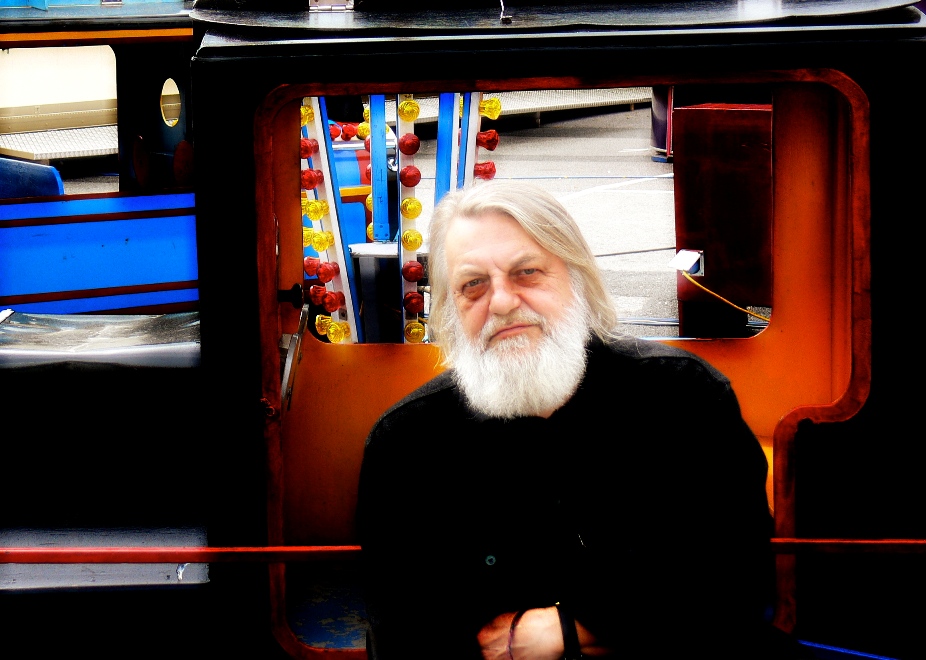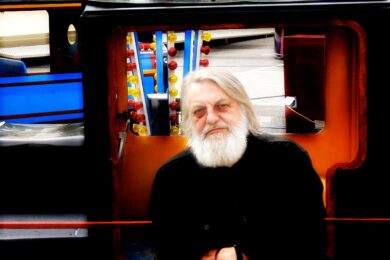The much sought after work of Robert Wyatt is getting a full reissue – on CD as well as vinyl, Domino Records has just announced.
His entire back catalogue is getting released on CD and vinyl format in October/November meaning that the albums Drury Lane, Shleep and Cuckooland will be available as LPs for the first time. These releases will be followed, in December, by a Robert Wyatt box set and are preceded on 20 October by the release of ‘This Summer Night’ single, which sees Robert working alongside French producer / composer Bertrand Burgalat.
RELEASE DATES
27 October 2008:
Drury Lane, Rock Bottom, Ruth Is Stranger Than Richard, Nothing Can Stop Us
17 November 2008:
Old Rottenhat, Dondestan, Shleep, EPs, Cuckooland
Robert Wyatt albums in chronological order:
Rock Bottom (1974)
Continually, and rightly, regarded as an emotionally charged masterpiece Rock Bottom, like all truly great records, defines its own moonlit world. Defiantly graceful, listening to Rock Bottom is like being invited into another person’s consciousness: fluid, deep, mesmerising and utterly unique. An intense meditative song cycle recorded in difficult circumstances Rock Bottom adds another layer of meaning to the term soul music. Its influence on successive generations of musicians is almost as palpable as the influence it has had on anyone who has immersed themselves in its ever glowing, self-willing beauty.
Ruth Is Stranger Than Richard (1975)
Highlighting Wyatt’s interests in township arrangements and ensemble playing, made explicit by calling a track ‘Team Spirit’, RISTR inverts the inward meditations of Rock Bottom outwards. The result is a set that startles with its rhythmic instinct and shape shifting composition. Drawing on both Wyatt’s breezy way with a time signature, and his ability to use his voice as a truly resonant instrument, the record contains not so much songs as abstract chamber pieces that bathe and unfurl in a warmth and stillness of their own. As on Rock Bottom something in Wyatt’s character clearly inspires his contemporaries to play to their unknown strengths when collaborating with him, the result is an album of linear life-affirming pop experimentation.
Nothing Can Stop Us (1981)
Signing to Rough Trade in the early 80s, on the understanding from his former label Virgin that he wouldn’t release any LPs for a while, Wyatt released a series of singles of cover versions. The set was recorded with a straight, simple, beauty informed by the experience of geopolitics just as the term was being invented. ‘Arauco’ drew on the street "mass songs" of a Chile protesting at the imminent arrival of Pinochet. ‘Stalin Wasn’t Stallin’ was a playful resurrection of a barbershop quartet that sincerely, and unbelievably, aligned the USA with the Soviet Union. Most startling of all was Wyatt’s version of Chic’s ‘At Last I Am Free’. Breathless and hymnal it gave pause for thought for anyone who liked to use the words personal and political in the same sentence. Ensuring the UK was represented in his survey of the New World Order, Wyatt paired a version of his old friend Ivor Cutler’s ‘Grass’ alongside a collaboration with the Bengali group Dishari that encouraged Bengali workers to join a trade union. Whilst his beard and directly to the left stance suggested agitprop and protest, these tracks highlighted his incredible gift as an interpreter of other people’s music and set his thoughts on contemporary politics in a highly considered and beautifully restrained context.
Old Rottenhat (1985)
Wyatt’s first LP in ten years arrived in the mid-80s and was unsurprisingly poignant in its analysis of the self-regarding destruction meted out by Thatcherism:
"There’s people doing ‘frightfully well’ there’s others on the shelf
But never mind the second kind this is The Age Of Self"
Despite the desolate and sombre nature of the subject matter of its songs Old Rottenhat has a steely sparkle at its heart. Played almost entirely by Wyatt himself, the record captures the sound of an artist in sel-imposed exile brimming with melodic purpose. Often setting his voice with echo against languorous synth drones, the record confirms Wyatt has a DNA that can’t help but achieve a sense of depth, grace and beauty. Overtly minimal, and in its use of refrain and lyrical simplicity, highly poetic, Old Rottenhat contrasts its very real sense of disappointment with the way things are with a determination to wonder at the strength of the human spirit. As Wyatt noted:
"I never associated shouting at people with making the world a better place."
Dondestan Revisited (1991 / 1998)
Originally released in 1991 Dondestan was remixed and reappraised in the studio in 1998 as Dondestan Revisited. Wyatt claimed he "ran out of words" so by basing half of the album’s tracks on her beautifully fragmented lyrics, began a song writing collaboration with wife Alfie Benge that flourishes to this day.
Unlike its predecessor, Dondestan also reunites Wyatt with the top half of the drum kit, which makes for typically inventive, lively and reflective accompaniment. Overall Dondestan is understated in feel and has the most fireside and introverted ambience of Wyatt’s recordings. Occasionally desolate in its subject matter and composition its rewards and textures are many when allowed to seep in. Most engaging of all is the sense of bloody mindedness that was revealing itself in Wyatt’s ability to make records when, how and about whatever he wanted; a modus operandi that coincided with his reputation as an artist of phenomenal integrity, modesty and compassion.
Shleep (1997)
Featuring long term collaborators and friends like Brian Eno, Phil Manzanera, Annie Whitehead, Evan Parker and newer accomplices such as Paul Weller, Shleep is as exuberating and immediate a record as Wyatt has ever recorded. Skipping along like the frustratingly evasive lambs he tries counting to encourage a good night’s sleep. Listening to Eno & Wyatt in unison on ‘Heaps of Shleep’’s series of elongated "Oahhh. Oahh, Oahhs" may be as good as listening to music gets. Bristling with an energy and self-confidence Shleep adds a radiant sunshine to Wyatt’s customary warmth. Clearly delighting in the process of collaborating in the studio again, it’s a remarkable testament to Wyatt’s muse that a record inspired by insomnia should produce such welcoming and restful lullabies.
EPs (1998)
EPs rounds up various one off singles, soundtracks and EPs Wyatt recorded from 1974 onwards. Among the highlights are the two singles Wyatt cut that, although recorded nearly 10 years apart, thrust him into the spotlight and onto Top Of The Pops. His reading of The Monkees’ ‘I’m a Believer’ reached the top ten; sounding both buoyant and resigned, his voice soared blissfully across such pop material. On ‘Shipbuilding’, a song that will eternally strike a chord with the listener, Wyatt famously manages to sing a protest song with the kind of rapture you associate with altogether different subject matter – making the record twice as poignant and understatedly powerful in the process.
Also included is the soundtrack to Animals which features the extraordinary ‘Pigs’, a version of Peter Gabriel’s ‘Biko’ and, equally direct in their purpose two love songs: ‘Te Recuerdo Amanda’ by the murdered Chilean songwriter Victor Jara and ‘Yolanda’ by the Cuban Pablo Milanes.
Cuckooland (2003)
Wyatt, on typically modest form in the liner notes to Cuckooland, insisted his voice was now "reduced to a wino’s mutter". Possibly as beautiful and assuredly restrained as anything he has done, Cuckooland was at 75 minutes Wyatt’s longest work to date. After Brian Eno expressed concern about its length, Wyatt placed a half-minute break in the middle so people could go and put the kettle on. Such sentiments suggest cosiness. But in amongst its light-as-a feather brushstrokes and Wyatt’s own muted trumpet playing, is an ire and barely contained anger both at our inability to be humanitarian and the follies that get carried out in that word’s name. Now into his fifth decade of recording, Wyatt had done whatever is the polar opposite of mellowing. Hearing Wyatt combine such inspirational common sense thinking, with what was now his trademark intuitively baleful voice and beguiling arrangements, was to hear an artist at the height of their powers.
Robert Wyatt & friends, Theatre Royal Drury Lane 8th September 1974 (2005)
Convening something of a supergroup to play through Rock Bottom upon its release in 1974, the cast Wyatt assembled is testament both to the high regard he has always been held in – along with his natural ability to blur boundaries between such constraints as the mainstream and the avant-garde. Here the assorted heavyweights: Mike Oldfield and Pink Floyd’s Nick Mason lock with the avant jazz sensibilities of Mongezi Feza, Julie Tippetts and Fred Frith. The result is a glorious sound that frequently edges towards chaos and back with Wyatt’s scat falsetto soaring above proceedings like a dove. The Rock Bottom tracks take on a dreamy physical shape, ‘Alifi B’ starts with Wyatt miaowing before the band begin turning Drury Lane into the Fillmore West. Listening to Wyatt and Tippetts duetting on ‘I’m A Believer’ as all hell breaks loose around them is to be transported into the front row to witness a very kind of Robert Wyatt magic.



